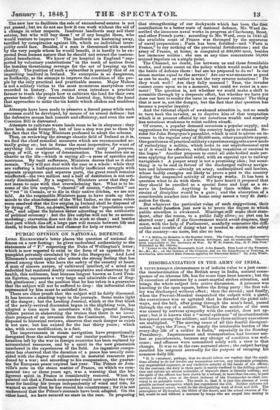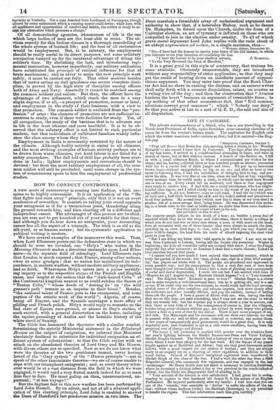DISORGANIZATION IN THE ARMY OF INDIA.
A PICTURESQUE circumstance is of infinite value to a just cause : the insubordination of the British army in India, natural conse- quence of an irksome life, has for some time been known ; but the ill execution of sentence by a court-martial strikes attention, and brings the whole subject into active discussion. A prisoner was kneeling in the open square, before the firing party : the first vol- ley was discharged without effect ; then the second; and finally, when the Provost-Marshal despatched the culprit with a pistol, the executioner was so agitated that he directed the pistol side- ways, and the ball, after going through the man's head, passed through the cap of a soldier. Whether the misfire of the men was caused by nervous sympathy with the convict, does not ap- pear; but it is known that a "moral epidemic "of insubordination has spread among the soldiers; and hence these military executions are multiplied. "The moving cause of all this fearful disorgani- zation," says the Times," is simply the intolerable burden of the every-day life of a soldier in India," especially in the Bombay Presidency. Imprisonment and transportation had become use- less as punishments, because any change of condition was wel- come; and offences were committed solely with a view to that change. It was so in the case narrated above ; the culprit having insulted his sergeant avowedly for the purpose of escaping his common daily life.
"It is r ecessary, perhaps, that we should inform our readers that the condi- tions alluded to do not involve any tremendous service, any intolerable privations, any unparalleled exposure, or any vindictive severity at the hands of the officers. On the contrary, the duty in these parts is mainly confined to the drilling-ground; rum and rations are almost unlimited; of exposure there is literally nothing; and the spirit of the officers has been shown by a refusal, in more than one case, to pass sentence of deatb, even at the direct instance of the Commander-in-chief, con- veyed in no palatable terms. The truth is, that it is just this absence of every possible rational occupation which has engendered the evil. Neither sickness nor service, however severe, would do the disorganizing work of drink and drill. The atmosphere of Hyderabad, the thirst of the desert, and the armed swarms of Ce- bu!, would be met without a murmur by troops who are cooped into mutiny in
barracks at Umbel's. Not a man deserted from Loodiruiah or Ferozepore, though allured by every enticement which a cunning enemy could devise; while here, with all appliances and opportunities of comfort and health, the soldier is ready to ac- cept any alternative which promises a change."
Of all demoralizing agencies, irksomeness of life is the one which large bodies of men are the least able to resist. The ob- vious remedy for this Indian disease is a thorough remodelling of the whole system of barrack life; and the best of all restoratives would be employment. But, to be salutary, the employment should be really useful in its direct purposes, not some arbitrary occupation vamped up for the incidental advantage of filling the soldier's time. By abolishing the lash, and introducing regi- mental instruction, however imperfectly, our military authorities have substituted the principle of rational influence for that of brute mechanism; and in order to make the new principle work safely, it must be carried out fully. That other motives besides that of terror acting on dull ignorance can secure complete disci- pline, is proved by the high state of discipline among officers both of Army and Navy. Assuredly it cannot be matched among the common soldiers and sailors. But then, the officers have the advantage of two influences, which reach the men in a very slight degree, if at all,—a prospect of promotion, sooner or later; and employment in the study of their business, with a view to that promotion. The common soldier is excluded from the "pro- fession" of arms : the chances of promotion are not sufficient in- centives to study, even if there were facilities for study. Yet, of all occupations, the study of the business that is to advance one in life is the least irksome and most healthful. It is to be ob- served that the salutary effect is not limited to each particular student, but that individuals of cultivated faculties widely influ- ence the class among whom they live.
Employment in India is necessarily restricted by the nature of the climate. Although bodily activity is suited to all climates, and the most striking examples of human activity perhaps are to be drawn from warm climates, yet hard labour is not fitted for a sultry atmosphere. The dull toil of drill has probably been over- done in India ; lighter employments and recreations should be devised: but from the most salutary employment of all, the com- mon soldier will still be precluded, until some change in the sys- tem of commissions opens to him the employment of professional studies.































 Previous page
Previous page